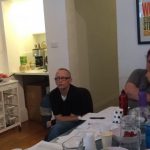Saving Aboriginal Mothers From Prison: An Interview With Free the People’s Debbie Kilroy

In Western Australia, the authorities still incarcerate people for unpaid fines. It’s the only jurisdiction in the country that continues to do so. If an individual can’t otherwise pay off their debt, this system sees it reduced by $250 each day they spend on the inside.
What this practice actually leads to the issuing of warrants for the arrest of poor people for having no money. And this government-sanctioned system of debt bondage disproportionately impacts single Aboriginal mothers.
Ms Dhu was a single First Nations mother in a domestic violence situation who was unable to pay her fines. In August 2014, after three days of “inhumane” mistreatment in police custody, the 22-year-old Yamatji woman became yet another Indigenous deaths in custody statistic.
Following an inquest into Ms Dhu’s death, the state coroner recommended that the gaol-for-fine-defaulters system be brought to an end. And although the McGowan government has committed to dismantling it, it’s being very slow off the mark about it.
So, in the meantime, Aboriginal mothers have continued to be imprisoned and their children have lost their primary carer. And when this system of imprisoning debtors finally ceases to exist, the practice of fining impoverished people for minor offences will still see them paralysed by debt.
Ending government debt bondage
Launched on 9 January, the Free the People campaign is raising money to pay the outstanding fines of Aboriginal single mothers in Western Australia, who are being imprisoned for not paying them. And the global response has been overwhelming.
Its initial goal was $99,000, which was reached within its first two days. Currently, it’s raised over $299,000. And its steadily climbing towards its new goal of $325,000.
The campaign was set up by prisoner advocacy organisation Sisters Inside chief executive Debbie Kilroy. And it’s being run as part of a four year campaign against the prison fines system initiated by Gerry Georgatos, national coordinator of the National Indigenous Critical Response Service.
The overincarceration of First Nations women
The largest growth in a particular group of inmates in this country is First Nations women. According to Australian Bureau of Statistics figures, there were 3,625 adult women in prison last November, and of them, 1,230 were Aboriginal and Torres Strait Islander women.
This means that while Indigenous women only make up 2.8 percent of the general female population in this country, they account for 34 percent of the women being incarcerated in the nation’s correctional facilities.
Indeed, between 1991 and 2017, the number of First Nations women being held in Australian gaols increased by 250 percent. And many of these women are caught in a cycle of incarceration for minor offences and homelessness on the outside.
Sydney Criminal Lawyers spoke to Debbie Kilroy about the impact the Free the People campaign is having, the debt system that’s crippling Aboriginal mothers and their children, and how the criminalisation of poverty needs to be eradicated.
Firstly, the Free the People campaign is raising money to pay the outstanding fines of Aboriginal single mothers in Western Australia, who are being imprisoned for not paying them. Ms Kilroy, what sort of impact is it having so far?
The campaign has been supported by over six and half thousand people and nearly $300,000, which is inspirational. I’m sort of in a state of shock that there’s so many people that do see this as an injustice.
A number of young Aboriginal mothers have contacted me. They have warrants. We’ve paid their fines, so they don’t get imprisoned. And they’re so shocked themselves.
It’s given them hope. That there’s people not only in this country, but around the world, that do care about what happens to them, and believe that poverty is not a crime.
So, you’re already been paying off fines?
We are. We’re just in the process right now of paying about another sixty off this afternoon.
The laws relating to fines and incarceration in WA apply to everybody. However, the campaign is focused on Indigenous single mothers. Why is that?
It’s based on Aboriginal single mothers because we know that these women are the most impoverished, the most criminalised and imprisoned in our community.
Western Australia is the only jurisdiction in the country that continues to imprison people for unpaid fines. Why is WA still hanging on to these laws that have been revoked elsewhere in the country?
The attorney’s response in a letter that I received on Tuesday – and he’s been saying this publicly prior to their election – is that the laws are complicated. The legislative reform package is complicated and very detailed. That’s what we’re being told as to why it’s taking so long.
I understand that you’re also advocating for a complete overhaul of the system of fines in this country. Can you outline what that entails?
We need to stop criminalising Aboriginal single mothers – really any woman or any man – if they’re impoverished.
What we’re seeing is that people who are impoverished because of capitalism are being criminalised and imprisoned, which then props up the prison industrial complex and allows it to flourish.
The time must come when we say, those that are impoverished must be supported in our community, so that they can live a life like the rest of us and not be at risk of ending up in prison or having children removed and taken by the state or being homeless.
And are you advocating for a system of fines that’s income-based?
Colleagues in Western Australia are advocating for that. It’s something that we all need to look at.
But, one thing that I’m very certain about is that governments of all persuasions and whatever jurisdiction must stop handing out fines to impoverished people for offences that are not deemed criminal in the views of ordinary people.
They may be deemed “criminal” on the law books. But, when you talk to people in the community, for example, about driving without a licence being a crime, they think that’s ridiculous.
And what we see is that when people do have fines, they’re handed over to debt collector corporations, and their fees are on top of it.
For example, we have a young single Aboriginal mother in Western Australia with three little children under six, who has escaped domestic violence. She has accumulated fines over a number of years. The amount of the fines is $8,100.
However, then there’s costs the infringement registry put on top. And then there’s fees on top of that. When warrants are issued it’s about $290 approximately that’s added. Her fines in total, which the debt collectors are chasing her for and on the infringement registry books, is about $17,500.
So, $9,555.15 are fees and costs that are added on. Now, she will never ever get her head above the water to pay that debt. And she will be further entrenched into poverty and have debt collectors chase her and warrants issued.
In her case, we’ve had the warrant stayed, so we can pay for the fines. But, you know, the debt collectors would make $9,500 on top of that. She ends up in prison and her children end up in care. She walks out the door and she’s homeless.
So, what would you say this system as it sits amounts to?
An attack on the poor.
And given the overwhelming response to your campaign, what would you say this tells us about public attitudes?
There’s a clear message to government that people across this country and around the world who supported the campaign do not want to see poverty as a crime.
This is even if they have financially supported it or not, because there are many people who can’t afford to donate money themselves, and they have sent messages saying that poverty is not a crime.
They do not want to see poverty as a crime and people further entrenched into poverty.
You’ve pointed out that the fastest growing cohort of inmates in this country is First Nations women. This is not just limited to WA where the fine system exists. It’s nationwide. Why is there a rapidly increasing number of Indigenous women being locked up over recent years?
When I talk about the prison industry, I’m talking about police, courts, prisons, probation, parole and anything that’s attached to that. And what we see is that the prison industry attacks the most marginalised in our community.
And the most marginalised people in our community are Aboriginal women.
In your opinion, Ms Kilroy, what could be done to reverse this trend?
We need the laws changed, particularly around fines. We’ve got to stop using prison as a default response for poverty, homelessness and drug addiction – for social issues.
They must be addressed in the context of social issues. People should be supported in the community. And the prison industry should not be used to make money on the backs of the most marginalised people in our community.
And lastly, you’ve touched on this already, but the WA attorney general’s office has said the laws around unpaid fines in that state are going to be amended. Are you expecting that this system of locking up fine debtors will soon be a thing of the past?
The attorney’s office has said that the legislative reform package will be tabled in parliament in the middle of the year.
We have offered to work with the attorney general’s office and the department to ensure that no Aboriginal mother, no Aboriginal woman or any woman is imprisoned between now and then for unpaid fines.







